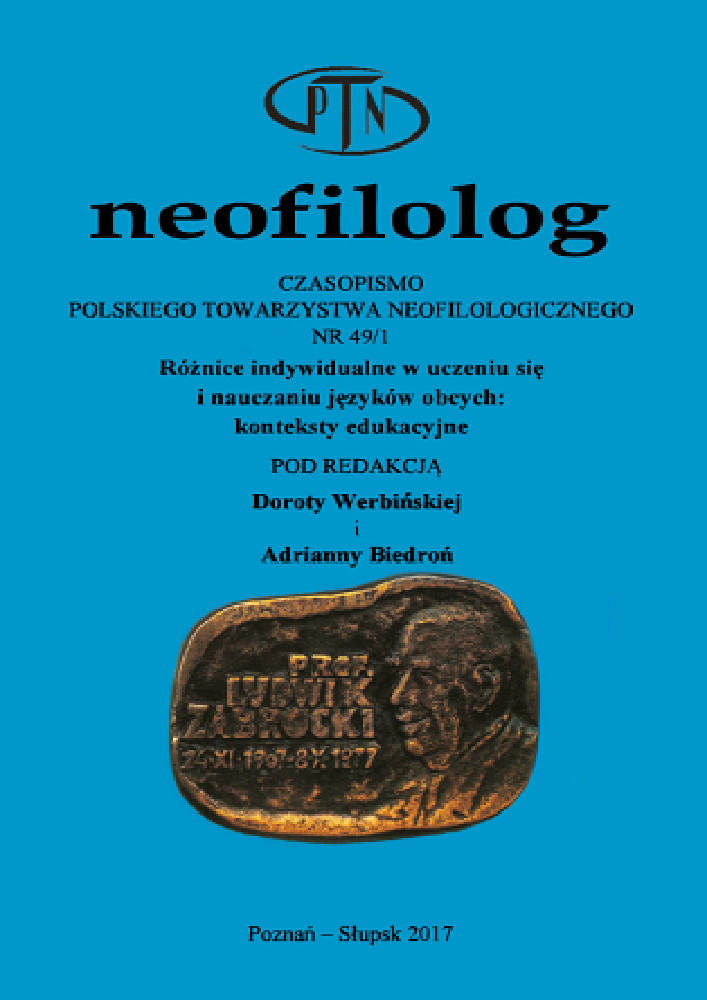Résumé
Out of all foreign languages in Polish schools Spanish has achieved the most dynamic increase in popularity within the last few years. For those most fascinated with Spanish and its culture, there have been six editions of the National Spanish Contest in Poland, organised by the Modern Language Association of Poland in cooperation with Adam Mickiewicz University’s Institute of Romance Studies. The aim of the article is to present the assumptions and activities of the contest, targeted at the most gifted students, as well as to examine the ways in which the best ones among them prepared themselves, including the amount of time they spent analysing the program guidelines. We will try to address the question whether contest finalists are truly gifted students or merely ones with high language aptitude. Special focus will be placed on finalists’ work with their teachers. We are also going to consider possible challenges and problems, which they faced during the preparation process.
Références
Alonso, J. A., Benito, Y. 1996. Superdotados: adaptación escolar y social en Secundaria. Madrid: Narcea, SA. De Ediciones.
Biedroń, A. 2008. ,,Teoria świadomego postrzegania (noticing). Intencja i świadomość w akwizycji drugiego języka”. (w) Autonomia w nauce języka obcego – co osiągnęliśmy i dokąd zmierzamy. (red. M. Pawlak). Kalisz: Wydział Pedagogiczno-Artystyczny UAM w Kaliszu, str. 45-52.
Carroll, J. B. 1965. ,,The prediction of success in intensive foreign language training”. (w) Training, research, and education. (red. R. Glaser). New York: Wiley, str. 87-136.
Czerwonka, D. 2010. ,,Środowisko rodzinne dzieci wybitnie zdolnych”. (w) Osobowościowe i środowiskowe uwarunkowania rozwoju ucznia zdolnego. (red. W. Limont, J. Cieślikowska, J. Dreszer). Toruń: Wydawnictwo Naukowe Uniwersytetu Mikołaja Kopernika, str. 53-61.
Dörnyei, Z. 2001. Teaching and Researching Motivation. Harlow: Pearson Education Limited.
Dörnyei, Z. 2005. The Psychology of the Language Learner. New York: Routledge.
Gardner, R. C. 1985. Social Psychology and Second Language Learning. The Role of Attitudes and Motivation. Baltimore: Edward Arnold.
Jiménez Fernández, C. 2004. ,,Alumnos superdotados: Caracterización e identificación”. (w) Diagnóstico y atención a los alumnos con necesidades educativas específicas: alumnos intelectualmente superdotados. Madrid: Secretaria General de Educación del Ministerio de Educación y Ciencia, str. 11-43.
Komorowska, H. 2002.Metodyka nauczania języków obcych. Warszawa: Fraszka Edukacyjna.
Majewska, R. 2013. ,,El alumno (super)dotado según las teorías de las diferencias individuales”. (w) El alumno de ELE: un alumno extraordinario. Marco teórico y propuestas prácticas para trabajar en la clase de Español Lengua Extranjera (ELE). (red. L. Sagermann Bustinza, J. Hadaś). Poznań. Komitet Główny Olimpiady Języka Hiszpańskiego, str. 33-49.
Mönks, F. J. 1992. ,,Development of gifted children: The issue of identification and programming”. (w) Talent for the Future: Social and Personality Development of Gifted Children: Proceedings of the Ninth World Conference on Gifted and Talented Children. (red. F. J. Mönks, W. Peters). Assen, The Netherlands: Van Gorcum, str. 191-202.
Limont, W. 2005. Uczeń zdolny. Jak go rozpoznać i jak z nim pracować. Gdańsk: GWP.
Renzulli, J. S. 1978, 2011. ,,What Makes Giftedness? Reexamining a Definition”. Phi Delta Kappan 60, 3, str. 180-184. https:/gseuphsdlibrary.files.wordpress.com/ 2013/03/what-makes-giftedness.pdf DW 13.08.16.
Rozporządzenie Ministra Edukacji Narodowej i Sportu z dnia 29 stycznia 2002 r. w sprawie organizacji oraz sposobu przeprowadzania konkursów, turniejów i olimpiad (Dz. U. nr 13, poz. 125 ze zm.).
Sękowski, A. 2001. Osiągnięcia uczniów zdolnych. Lublin: Towarzystwo Naukowe Katolickiego Uniwersytetu Lubelskiego.
Sękowski, A., Jurko, M. 2010. ,,Wybitne zdolności jako wymiar psychologiczny i pedagogiczny”. (w) Osobowościowe i środowiskowe uwarunkowania rozwoju ucznia zdolnego. (red. W. Limont, J. Dreszer, J. Cieślikowska). Toruń: Wydawnictwo Naukowe Uniwersytetu Mikołaja Kopernika, str. 11-31.
Skehan, P. 1997. Individual Differences in Second-Language Learning. London: Arnold.
Sobańska Jędrych, J., Karpeta-Peć, B., Torenc, M. 2013. Rozwijanie zdolności językowych na lekcji języka obcego. Warszawa: Ośrodek Rozwoju Edukacji.
Sternberg, R. J. 2002. „The theory of successful intelligence and its implications for language aptitude testing”. (w) Individual Differences and Instructed Language Learning. (red. P. Robinson). Amsterdam: John Benjamins B.V., str. 13-44.
Szmidt, K. T. 2013. Trening kreatywności. Podręcznik dla pedagogów, psychologów i trenerów grupowych. Gliwice: Helion.
Licence
© Małgorzata Spychała-Wawrzyniak 2017

Ce travail est disponible sous licence Creative Commons Attribution - Pas de Modification 4.0 International.
Auteurs :
Les auteurs de textes acceptés pour publication dans la revue Neofilolog sont tenus de remplir, signer et renvoyer à l'adresse de la rédaction, un accord sur l'octroi d'une licence gratuite pour les œuvres, avec obligation d'accorder une sous-licence CC.
En vertu de cet accord, les auteurs des textes publiés dans la revue Neofilolog accordent à l'Université Adam Mickiewicz de Poznań une licence non exclusive et gratuite et permettent l'utilisation de la sous-licence Creative Commons Attribution-NoDerivatives 4.0 International (CC BY-ND 4.0).
Les auteurs se réservent le droit de disposer librement de l'œuvre.
Utilisateurs :
Les utilisateurs d'Internet intéressés ont le droit d'utiliser les œuvres publiées à partir de l'année 2017 sous réserve des conditions suivantes :
- reconnaissance de la qualité d'auteur - l'obligation de fournir des informations sur la qualité d'auteur, le titre, la source (liens vers l'œuvre originale, DOI) et la licence, ainsi que l'œuvre distribuée ;
- sans créer d'œuvres dérivées - l'œuvre doit être conservée dans sa forme originale, p. ex. les traductions ou les interprétations ne peuvent être distribuées sans le consentement de l'auteur.
Tous les textes publiés sont soumis au droit d'auteur.
Autres :
L'Université Adam Mickiewicz de Poznań se réserve le droit à la revue dans son ensemble (mise en page, forme graphique, titre, conception de la couverture, logo, etc.).
.
